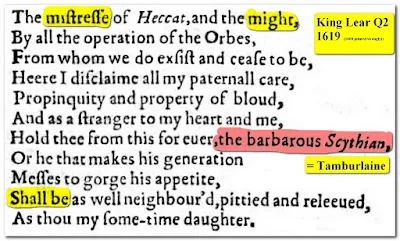J A M E S S H A P I R O ( 6)
What the barbarous Scythian has to do with King Lear (Q2 vs FF) ?
_____________
J,Shapiro
|
| Comparing King Lear Q1/Q2 (1608/1619) with the First Folio (FF1623) serious questions arise.- Unfortunately in his books „Contested Will: Who Wrote Shakespeare?“(2011) and in „The Year of Lear, Shakespeare in 1606 (2015)“ James Shapiro did not deal with such essential problems like: 1).Who corrected the lines in King Lear, from „mistresse of Heccat“ ( Q2 1619) to „miseries of Heccat“ (FF 1623) or „shall be“ to „shall to my bosome be“ (s.Example Faksimile.)
2.) Who was interested in (and responsible for) many of such crucial text changes between 1619 and 1623?
3.) Why King Lear (and his author) in Q1/Q2/FF does express that "the barbarous Scythian" [Tamburlaine alias Marlowe] shall be as well neighbour‘d, pittied and releeved as his Daughter [Cordelia]
4.)Why in 1623 the passage of „The barbarous Scythian“ was clarified by „shall to my bosome be as well neighbor’d, pittied and releev’d as my (some-time) daughter [Cordelia] ------------------ "King Lear" is a gloomy tragedy with a sense of deep general pessismism, likely written in 1605. Consider that both, Marlowe's mother and legal father "John Marlowe" died in 1605. Robert Ayres and others assume that Marlowe was a bastard.- his biological father -->Roger Manwood?) ( s. also previous Blog 349)
_____________
Without -->a plausible theory you will not get any sensible interpretation! VIDEO (MARLOWE THEORY) ——- VIDEOS – Complete Video Archive: Open Heading--> Home -->Videos -- Shorts -- Posts ->Popular |







